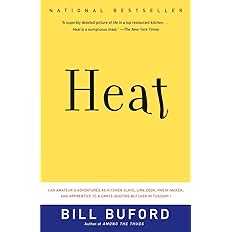Book Review: “Heat” – Bill Buford
by Jan

Any teenager thinking about doing an apprenticeship in cookery needs to read this book, so they can go in with their eyes wide open. Watching cookery programmes on television is not exactly related to real life in a commercial kitchen.
Buford was asked by the New Yorker to write about Mario Batali, a famous New York chef. So he applied for a job as his slave, hence the subtitle of the book: ‘An Amateur’s Adventures as Kitchen Slave, Line Cook, Pasta-maker and Apprentice to a Butcher in Tuscany’. This book is part memoir, biography and tutorial, ie. he immersed himself in the kitchen to learn how commercial kitchens operate. The book also included restaurant gossip about, for example, Batali’s excessive habits, or who’s doing what in the kitchen. But he enjoyed the kitchen banter and camaraderie so much so that he quit writing and returned to Batali’s Babbo restaurant.
Even before I started reading it, I guessed what fate would befall Buford; he’d have to be a masochist. Batali did some of his training in London under Marco Pierre White, who, along with Gordon Ramsey, couldn’t control their moods to put it mildly. So reading it was a bit exhausting because, to me it was so predictable, even though amusing.
This was not going to be a series of sophisticated dinner parties which Buford liked to dish up. And, of course, he’d have to bring his own knives.
Some sous chefs he worked under were deliberately cruel. It was a small kitchen so he had to work cheek by jowl with his colleagues. One night the sous chef splattered him with hot oil, and instead of apologising, he said “Good” and splattered him again. This sous chef came across as a spiteful nutjob.
But some wounds were self-inflicted. He learned that if he didn’t have burns, blisters and cuts permanently on his hands, he would be deemed not to be working hard enough. For example, he cut himself while boning a duck, and there was blood everywhere. It probably would have been safer to become an arms dealer in a corrupt African country.
Not all wounds were visible; Buford had to dodge colleagues with mood swings, toxic personality disorders, and bullying. He had to play mind games with the boss of the prep section. What would he screw up next? And, if the veg wasn’t cut properly, why didn’t she train him properly, instead of bullying and victim blaming? A much better result for everyone, plus no food waste. So she was the one with the problem, not Buford, the untrained ‘kitchen slave’.
There are several celebrity chefs who court media attention, and who don’t know how to behave. But this aggressive angry behaviour from celebrity chefs attracts viewers’ eyeballs because it’s entertaining, and increases ratings. If a novice cook watched this behaviour on a screen, for example Hell’s Kitchen or Burnt, and noticed that nobody in the kitchen was reacting, then it could be seen as accepting this as normal or cool. But in an office environment HR would receive a complaint for such behaviour.
This aggressive bullying behaviour did not start with cookery shows on television; commercial kitchens are traditionally playgrounds for bullies and an assortment of people with mental health disorders. However, many commercial kitchens are not violent zoos, and therefore would not make very exciting viewing, but much better places to work.
However, some apprentice cooks might want the name of a famous restaurant on their resumés, which implies that they might have to endure a year or two being bullied. To endure this they have to dissociate themselves from being the victim of bullying so they can cope. Often females have worse experiences. Often males think it’s just a bit of a laugh, and it’s OK to continue with this behaviour.
Then maybe later on in their careers, they might rationalise it so that if they had to endure it then why can’t the next apprentice?
The inference I took from Heat is that it’s important to call out abuse.